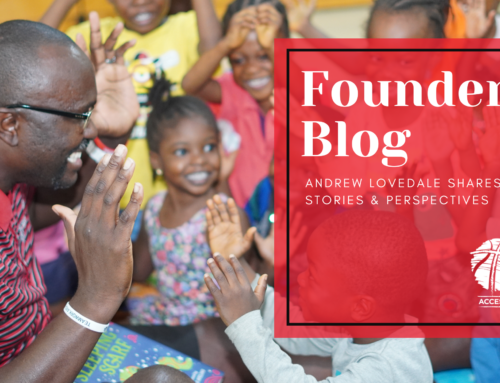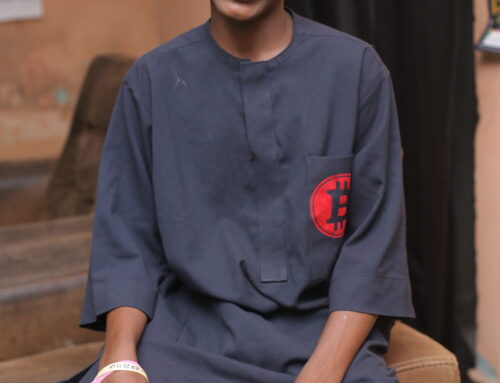One of A2S’ primary education programs is the Scholars Program. This program provides scholars in Nigeria with the opportunity to pursue higher education opportunities.. In this article, our intern Shalom catches up with our scholars here in the U.S.
My name is Shalom Olugbodi and I am a Davidson College student serving as one of the A2S interns this summer. Recently, I had the pleasure of speaking with two of the high school scholars, Blessing Ogbeiwi and Happy Arune. They have embarked on a journey of growth and adaptation, moving to a new country and embracing a different education system. Their experiences provide valuable insights into the challenges and triumphs of such a transition. Check out what they had to say about their experience in the following interviews:

A week later, she informed me that I had scored the highest and A2S wanted to sponsor my education. ~Blessing
Interview with Blessing Ogbeiwi
Shalom: Can you tell us a little bit about yourself?
Blessing: My name is Blessing Ogbeiwi, I am 18 years old and a rising senior at Covenant Day School. I also run track and play field hockey. My aspiration is to become a doctor in the future.
Shalom: Can you tell us a bit about your life and educational background in Nigeria?
Blessing: I went to a public school where I grew up in Benin City. The large student population led to a poor teacher-to-student ratio and the quality of teaching was not great. The school lacked a library and no good books. Overall, the education I received there was subpar.
Shalom: How did you get introduced to A2S and the Scholars Program?
Blessing: My older brother actually joined A2S first. He became a student at the After School Academy in 2014. He introduced me to the program and I became a member of the After School Academy in 2015 when I was 8 years old. In March 2022, the Youth Center Director called me and some classmates to her office for an exam. She didn’t tell us why we were writing the exam so we assumed it was going to be used to identify the best students. A week later, she informed me that I had scored the highest and A2S wanted to sponsor my education. She asked if my dad would agree to let me study in the U.S., and I told her he would if it was legitimate. When I was asked if I would prefer to study in the U.S. or Nigeria, I chose the United States.
Shalom: What were your expectations before moving to the U.S. for your education?
Blessing: I didn’t have any expectations. I was open minded when I made the move and I was ready for whatever came my way.
Shalom: How did you find the academic environment in the U.S. compared to Nigeria?
Blessing: The class sizes were smaller which enabled me to ask questions when I was confused. I felt more supported by both teachers and classmates and the teaching style was more interactive compared to Nigeria. I was taught and not just spoken to unlike my educational experience in Nigeria.
Shalom: What were some of the biggest cultural adjustments you had to make?
Blessing: The biggest adjustment was the food, which was quite different from what I was used to. I also had to adjust to the weather, especially the cold. Making friends was challenging because I am quite reserved and I am not one to go up to people; however the students were friendly and approached me, which I did not expect. My accent created a communication barrier initially, I could not understand people and they couldn’t understand me either. Additionally, I had to adjust to playing sports; now I run track and play field hockey.
Shalom: What resources or support systems in the U.S. helped you adapt to your new educational environment?
Blessing: Having access to the internet, a computer, and technology made the switch easier. Also having A2S as a resource was very helpful. The teachers at my school also made the switch easier, having a better educational system was incredibly helpful.
Shalom: What skills or knowledge have you acquired in the US that you feel you wouldn’t have gained in Nigeria?
Blessing: If I had stayed in Nigeria, my writing, technology, and computer skills would not be as advanced as they are now. The opportunities and resources available in the US have significantly contributed to my growth in these areas. Access to well-equipped libraries and modern technology has allowed me to develop skills that would have been difficult to achieve back home.
Shalom: How do you envision contributing to your community or country with the education and experiences you have gained?
Blessing: I plan to return to Nigeria with A2S for a vision trip and conduct a workshop with the kids. I’ve raised over $3000 and will use the money to provide digital tools for the media club, as I was once a member myself.
Shalom: Is there anything else about your journey that you would like to share with us?
Blessing: I actually started attending the After School Program so I could get food.
Shalom: What message would you like to share with the donors and supporters of the scholars program?
Blessing: I want to express my gratitude to the donors, Mr. Andrew, the Nigerian and U.S. A2S staff. I started as an After School Academy kid, so they’ve been helpful for years.
Shalom: Thank you, Blessing, for sharing your experiences and heartfelt message.
Blessing: You’re welcome!

I expected the education to be challenging but I was glad because I would be able to ask questions. I viewed the A2S test as a reflection of the U.S. educational system and understood that not everything would be easy. ~ Happy
Next, we have Happy Arune, who will provide us with insights into her journey and the impact of the scholars program on their life.
Interview with Happy Arune
Shalom: Can you tell us a little bit about yourself?
Happy: My name is Happy Arune, I am 17 years old and a rising junior at Gaston Christian School. I play basketball and run track as well. My aspiration is to be a nurse when I’m older.
Shalom: Can you tell us a bit about your life and educational background in Nigeria?
Happy: I attended a public school with a lot of students and not enough teachers. This made it difficult to build a close relationship with my teachers or ask for help when I did not understand the lessons.
Shalom: How did you get introduced to A2S and the Scholars Program?
Happy: My introduction to A2S was through their yearly basketball summer camp, which I started attending at the age of 12. Eventually, I was called to the office and asked a few questions about myself and my family. After taking a test, I was enrolled in the After School Academy before coming to the US.
Shalom: What were your expectations before moving to the U.S. for your education?
Happy: I expected the education to be challenging but I was glad because I would be able to ask questions. I viewed the A2S test as a reflection of the U.S. educational system and understood that not everything would be easy.
Shalom: How did you find the academic environment in the U.S. compared to Nigeria?
Happy: I agree with Blessing. The smaller class sizes and enthusiastic teachers was something I did not get the privilege to experience in Nigeria. I was actively taught rather than just being told things.
Shalom: What were some of the biggest cultural adjustments you had to make?
Happy: I also struggled with adjusting to the food; I am a little picky so finding food I was okay with was a little challenging. The school system here is very different from Nigeria’s, which took some getting used to. Religiously, there was a change as well; back home I attended church multiple times during the week, whereas here I usually only go on Sunday, and atheism is more common here. Being away from my family was hard, especially since I was used to having my older siblings around but A2S became my family. The weather, specifically winter, was another adjustment I had to make. I did not know how to use the computer which was a barrier for me, eventually I was taught technology skills.
Shalom: What resources or support systems in the U.S. helped you adapt to your new educational environment?
Happy: Having access to technology was very helpful to getting accustomed to the U.S. education system. Supportive teachers, classmates, and A2S were helpful.
Shalom: What skills or knowledge have you acquired in the U.S. that you feel you wouldn’t have gained in Nigeria?
Happy: I agree with Blessing. My writing, technology, and computer skills would not be as advanced if I stayed in Nigeria. I gained access to libraries and teachers that taught skills that would have been difficult to achieve back home.
Shalom: How do you envision contributing to your community or country with the education and experiences you have gained?
Happy: I hosted a shoe drive earlier this year; I’m going back to Nigeria this summer to donate shoes to the basketball program. This is where I started at A2S, so it’s my way of giving back to my roots.
Shalom: Is there anything else about your journey that you would like to share with us?
Happy: I want to play basketball as much as I can and take care of people.
Shalom: What message would you like to share with the donors and supporters of the scholars program?
Happy: Thank you, I’m grateful. God bless them, it was like a dream come true. Two or three years ago, I would not think I would be in America. They made my dream come true.
Blessing and Happy’s journeys are inspiring and showcase the importance of opportunity. It’s evident that the skills and knowledge they acquired in the U.S. are equipping them to make significant contributions to their communities back in Nigeria. The dedication they each have to give back and make a difference is commendable and speaks volumes about their character and commitment to positive change. But this is just the beginning! Stay tuned for the second part of our interview series, where I interview two A2S Scholars in college.
Shout out to all of our donors, host schools, host families, and volunteers who make this experience possible for our scholars! We are so grateful for how you invest in the futures of our youth.
























